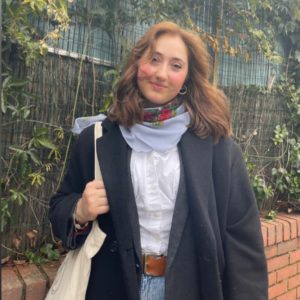Portraits of exiled women students in France: the path of Rojda, a woman artist committed to young people
ROJDA
Can you tell us a little about your journey until you arrived in France?
I come from Syria; I then went alone to Turkey where I studied cinema for two years before working in this field for a while. I came to France in 2019 because this country was for me one of the countries that specialized in cinema and because I had the opportunity to obtain a scholarship in the framework of a partnership between an association and the city hall of Paris which allowed me to come and study here. I knew that in Syria and Turkey, the situation was not stable and that there was no future for me there. I first studied French for a year in an FLE center because I didn’t know the language very much at all, then I enrolled in the first year of a degree in cinema and audiovisual at the University of Paris 3.
How did your return to studies go here? Did you encounter any particular difficulties?
The first year was difficult because it was during the covid-19 health crisis, so all the courses were remote, which was not a great way for me to learn a language. Everyone encouraged me to go back to school and apply for a degree, but it was still very difficult, especially to speak in class. The language barrier was too high so I repeated my first year and then I finally decided to stop taking courses that year to have more practical experiences than theoretical ones and to improve my French before going back to school.
What are your future projects?
I’ve gone through a lot during this period so I wrote scripts about young people who came alone to France, who I was also able to meet, so I would like to launch a short film before the summer.
Do you have any advice for other exiled students?
I have two main pieces of advice: the first is to learn and master the language because it is the key to succeeding here and to return to school. The second thing is to be prepared for the cultural difference.
What does the International Women’s Rights Day on March 8 mean to you?
In Syria, women have limits to succeed, they are not encouraged, either because of religion or because of false interpretations of it. It is true that there was a war, but it showed us that there is another way to succeed, especially in Western countries where women have more rights.


